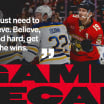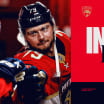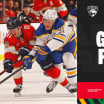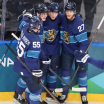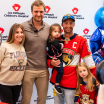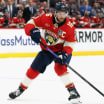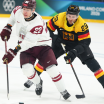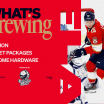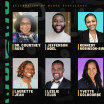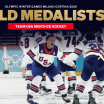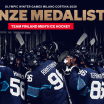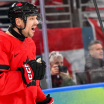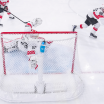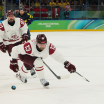I immediately felt a crack.
It's been over three years since it happened, but I remember everything about the day I almost had to give up on my dream. It was 2015 and I was practicing faceoffs with a teammate during a pre-game warmup before a game with the U.S. National Team Developmental Program. It was something I'd done countless times, but for some reason this time was different.
Logan Hutsko: Fighting Through The Fear
By
Logan Hutsko @lhutsko9 / FloridaPanthers.com
My head dipped down into his chest on the draw and in that second I knew that something was really wrong. A tingling and numbness shot down the left side of my body. I suddenly felt weak. I skated off the ice, but couldn't even take off my helmet. I had to enlarge it just to slide it off.
That Sunday, I went to get an X-ray. The doctor said everything looked good, but they still were going to send it to a radiologist. I still didn't feel 100 percent, but I thought that I was in the clear, so I rejoined the team and got back to work. I practiced three times and played one game.
But then, on Wednesday, the radiologist called.
"You need to get to a hospital right away," he said.
In that moment I was in shock. I went right back in and found out that I had actually fractured my C6 vertebra. It's an injury that you don't really see a lot of in hockey. In fact, the doctor said, it's usually found in car crash victims. In most cases, it can often cause paralysis because it's the bone that circles the spinal cord. If anything in that area gets loose, it can zap the whole area.
They told me how lucky I was, but I didn't really understand.
After meeting with the doctor, I was told that the injury should heal up nicely and I'd be good to get back to playing hockey. They told me told me that the bone would heal first and then all of the muscle damage would heal after. I was like, "Great!" But that didn't happen. I went back to see the doctor a month later and the bone had hardly made any progress, but the muscle had healed. The whole thing was working backwards - not a good sign.
"I know a lot of hockey players that end up doing something else," the doctor told me. "You might want to start thinking about other things because sometimes these things don't heal."
In that moment, it was hard to feel lucky.
I felt angry. Everyone was telling me how lucky I was, but I couldn't play hockey. I couldn't do the thing that I had dedicated my entire life to. There was just so much anger and emotion. I was super, super low and I started to get depressed. I just didn't know what to do with myself.
That's when I started to wonder if I should even play hockey anymore. I talked to my mom a little bit about it, but it was mostly an internal battle. After a while, I had actually pretty much made up my mind about it… maybe I don't even like playing anymore?
I thought about how I wanted to be the type of guy that could teach my future kids to throw a football. Heck, I wanted to be able to even have kids. If you get that close to be paralyzed from the neck down at 16 years old, it's pretty scary stuff. But in that struggle, I thought about God's plan.
I grew up in a very Christian household. I went to Sunday school and did all the right things, but I kind of felt like I was born into it. I never took action on my own. It was just something that I did because it's what I was raised to do. But after my injury, I found that it really gave me strength.
I started to really believe that God has a plan for me. Everything that I had been through up until that point had happened for a reason. If he didn't want me to play hockey, he was going to take it away. But if he gave me an opportunity to heal over the next three months, I'd go back to playing hockey again. That's what I stuck to. It's what I believed and understood.
Then, four months after the injury, I went back to the doctor and he told me I was healed.
I thought to myself, "Man, this is great. I'm going to able to play again. I'm a hockey player."
But then I had my first practice, and something crept up that had never been there before - fear.
I was scared to go after pucks. I was scared to go into the corners. I was scared to be physical. I was scared every time I stepped onto the ice. I was looking left and right, nervous that someone was even going to touch me. I had to keep telling myself, "You're fine. You're healthy."
It took me about a month or so for that feeling to finally sink in.
Then, my second game back, I took a hit and my back started spasming. I went right to the bench and told my trainer, "I'm out for the game. I'm done. I'm done. I hurt my neck again. It's broken." It was that fear again. It was back. I went back to the doctor after that and got another CT scan just to prove to myself that I was OK. I went home, but this time I came back.
In my final game that season, I scored a hat trick. It was a moment hat made me feel like I could still really play this game. It gave me a lot of confidence to bring into the next season. I trained hard all summer and came back in great shape. This year was going to be different.
The following season, however, I suffered another setback. In our third game of the regular season against Boston University, I got hit. We were on the power play and I was in the defensive zone. I wasn't expecting to get hit at all. It's very rare to get hit in that situation.
Right away, I knew something was wrong with my knee.
I skated off the ice, but soon found out that there was damage to my MCL and kneecap in my left knee. Just like that, I was out of the lineup again. I waited around for it to heal on its own, but it never healed. Three months later, I got an MRI and it was much worse than we thought. I had to get surgery and missed the entire season leading up to the 2017 NHL Draft.
The fear I had conquered before was now replaced with frustration.
I was like, "Are you kidding me? Haven't I been through enough already?"
There was a lot of anger, but I still believed I'd be back. I knew God had a plan, so I just kept going. A few months later I watched players I grew up with realize their dreams at the draft while I didn't even get a chance to prove myself. It would have been different had I played all year and simply didn't deserve it. For me, that would have been easier to accept.
After my surgery, I ended up going back home and finished school online. When I was healthy enough, I went to start training in Connecticut. I trained for seven months, rehabbing my knee and just trying to get back to where I was. I had a lot of atrophy because of my knee injury. I'm still working on getting back from that, like getting my left quad as big as my right.
Once I arrived on campus at Boston College, things started falling back into place.
At first, the coaches didn't really know what I could do. They hadn't seen me on the ice since my sophomore year of high school. I'm sure they hoped that I could be that type of player again at some point, but nobody knew the exact timeline. I didn't expect things to go as well as they did.
As the season went on, my confidence grew and grew. I think that was the biggest thing. I never stopped believing that I could still do the things I knew I could do, that I was the same player I was in 10th grade. I started to do some things where I thought to myself, "Hey, I still got it."
But even after the season I had, leading the team in scoring and being named the Hockey East Rookie of the Year, I still don't feel normal. I still don't feel like I'm back to where I was, and I still have work to do to get back there. But compared to where I was at this time last year? Well, I feel lightyears away. This summer, I'm just going to keep on working to get back to my old self.
In a way, trying to get back to the player I was really pushes me.
It gives me a lot of positivity knowing that hopefully my best days are ahead of me. It fuels me. I was injured for two years, but as I look back at what I was able to accomplish as a freshman at Boston College, I just think about what I'm going to next year and the year after that.
That was the attitude I brought into my pre-draft meetings with the Florida Panthers.
I believe that nobody really knows where my ceiling is after having missed so much time. That's something that excites me because I can really drive and push myself. That was my whole spiel to them in that meeting. After that, I felt like this was going to be where I ended up.
As soon as they traded back into the third round I was like, "This is it. Please. Please. Please."
I traveled around a lot growing up, but Florida has always been my home. I left when I was two years old to head up north, but most of my family is still here. Every summer I'd come visit and go back and forth. My family would always be considered not native wherever we lived up north. We lived in places like Pittsburgh, Toronto and New Jersey, but it wasn't home. Florida is home. It's where everyone is -- my aunts, uncles, cousins, etc. - and now I'm back.
I'm still not where I want to be, but I'm heading in the right direction. No matter where you are in life, you always want to be better. If you're picked second-overall in the draft, you want to be first. If you're the 89th overall pick, you want to be 88th. This draft was about getting a chance.
With the Panthers, I have a path to follow, a clearer future than I had three years ago.
I'm ready to work, to become the player I've always known I can be.
FloridaPanthers.com's Jameson Olive contributed to this article.

